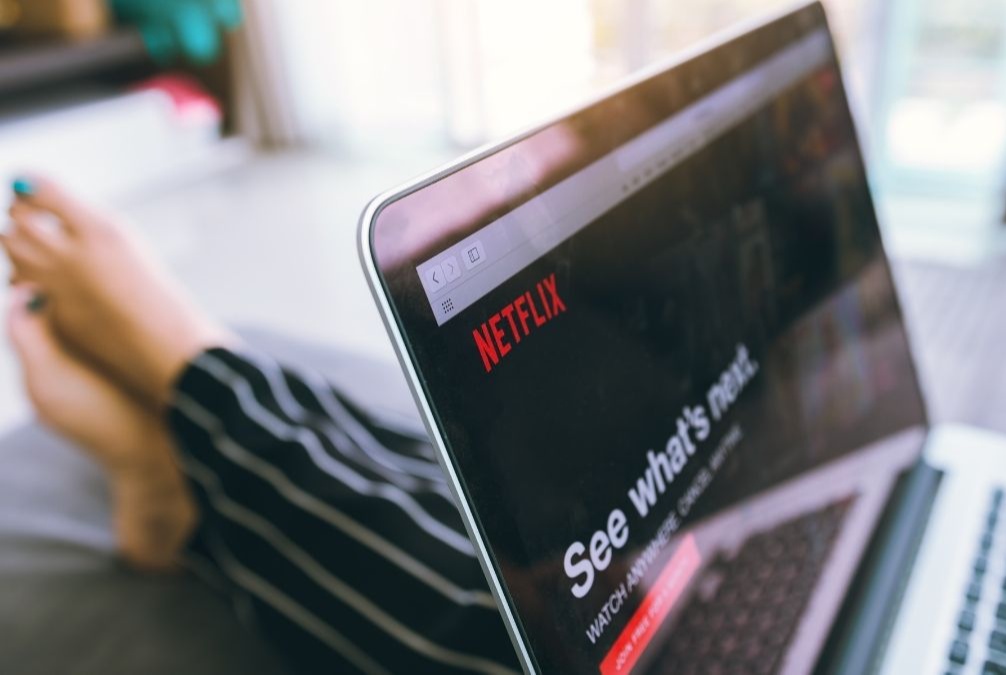What Is *Netflix And Scroll* And Why Do People Do It?
It was the finale we'd waited almost a decade for. The living room lights were off, the snacks were lined up across the coffee table. The conditions were perfect. I pressed play and eagerly looked over at my boyfriend as the opening credits for the last ever episode of Game Of Thrones rolled across the screen. Eight years of patient waiting and there he was, just scrolling through his phone.
Something very sinister is happening to our attention spans. Or, at least, we're doing something very sinister to them. At some unknown point we allowed double-screening to become a constant and relentless part of our lives. Socks and sandals, now Netflix and scrolling. Think about it, when was the last time you settled in to watch a series and you didn't intermittently scroll throughout it? How many times did you pause your favorite K-drama to read some long viral thread on Twitter?
Somewhere along the lines scrolling stopped being digital transportation and became a destination all of its own, as our need for screens morphed into some kind of overwrought dystopian parody. Now, pressing "play" on the big screen is just your cue to balance the medium screen on your lap while you go through an assortment of endless timelines on the little screen. It's the holy trinity of the digital world.
When was the last time you settled in to watch a series and you didn't scroll throughout?
Scrolling through your favorite shows and films quickly became, not just the norm, but an expected part of watching anything at all. So, when did we stop being able to watch TV without scrolling? And what is it doing to the shows we watch?
Scroll-friendly viewing
Take Emily In Paris, one of the most talked about series on Netflix last year. The show follows Midwestern girl Emily as she moves to Paris to bring the American perspective to her company's marketing office in France. The series was hugely divisive, with critics widely panning the show while audiences couldn't get enough. But one thing most people agreed on? It was an "easy watch." The scenes are often short, brief snippets of clipped dialogue, and it certainly helps that they're interspersed with various shots of the Parisian cityspace.
Your brain need only engage fully for a quick period of time before your concentration is easily broken and your thumbs get back to work on the little screen. You probably don't even need to put your phone down for the little moments of TV that happen in between scroll sessions.
But it's not just Emily In Paris. Every episode of Love Island is perfectly set-up as a side-dish for the main meal over on your phone. It has the standard brief moments of dialogue, peppered with all-important shots of the villa which act in the same way as the Emily in Paris cityscapes, allowing our focus to break and the little screen to call us back. The show even flags to the viewer when they need to look up with a handy, "I've got a text!"
It's all part of the cross platform experience. It gets you—not just watching the shows—but interacting with them too. Research from Nielsen, a US data firm, found that a majority of us see our second screens as an extension of the main event, with 71 percent of people using their phones to look up something related to the content, and 41 percent using them to speak to friends about what they're watching.

By creating the perfect conditions for watching and scrolling simultaneously, these shows can maintain high viewing figures while also encouraging strong social media engagement, until you end up watching the show on the big screen, googling the show on the medium screen, and liking posts about the show on the little screen. Remember that dystopian parody I mentioned?
The fact that we're often scrolling specifically is all to do with dopamine (isn't it always?), according to science journalist Sharon Begley. In her book Can't Just Stop: An Investigation Of Compulsions, Sharon details how we feel distinct dopamine plunges when reality falls short of what we hoped or expected. "That feels bad, so we keep trying to do something that will make reality live up to expectations." In short, when we get likes, comments, and shares, we find that they don't actually live up to expectations in terms of a dopamine spike, so we keep scrolling, hoping for something that will.
If TV is slowly becoming the perfect background noise; beautiful and formulaic but lacking in nuance, it's only because we asked it to be.
Source: Cosmo PH

Post a Comment
0 Comments